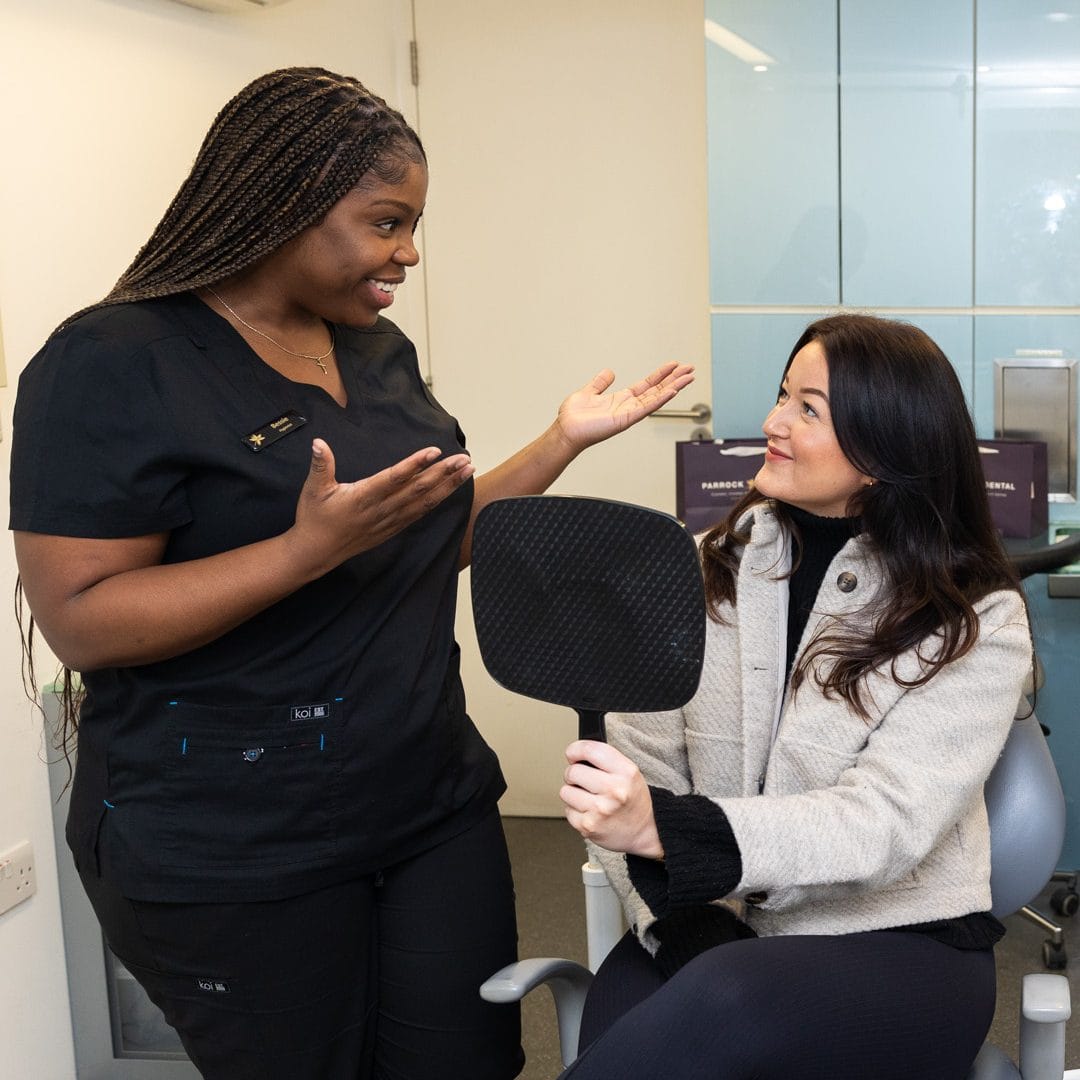General Dentistry in Gravesend
General dentistry refers to the range of dental restorative treatments that protect your oral health.
Dental check-ups
General dentistry refers to the range of dental restorative treatments that protect your oral health. At Parrock Dental in Gravesend, these treatments include:
- Regular check-ups
- Dental hygiene
- Dental bridges
- Dental crowns
- Dentures
- Oral surgery
- Root canal treatment
- CEREC technology
We will look in more detail at each of these treatments below. If you live in Northfleet, Gravesend, Rochester or in Kent, call or book online for a consultation about any of our general dentistry treatments.

Which general dentistry treatments are available in Northfleet, Kent?
These are the most common general dentistry treatments that we offer at Parrock Dental:
Regular dental check-ups
You should see your dentist for a check-up once or twice a year. A regular check-up allows your dentist to check on your oral health and treat any issues before they become a bigger problem.
Dentists will check and help prevent the onset of tooth decay as well as gum disease. We welcome all patients, including young children, for a regular dental check-up.
Dental hygiene
A hygienist works with your dentist to keep your mouth clean and healthy to prevent tooth decay and gum disease. Dental hygienists offer advice about lifestyle, diet and how to best clean your teeth.
Hygienists remove plaque and tartar from your teeth which makes them look better and reduces the chance of causing tooth decay and gum disease. Gum disease is the biggest cause of tooth loss in the UK.
Dental bridge
A dental bridge is a way to replace a missing tooth which is usually on one side of your mouth.
A dental bridge needs healthy and stable teeth either side of the gap which anchors the bridge.
You should replace missing teeth for several reasons – it affects how your smile looks; the gap affects the health of the neighbouring teeth and missing teeth can affect your bite.
Dental crowns
If you have a tooth that has been broken or has decay and it is too large for a filling, you will need a crown. A dental crown, also known as a cap, sits over the top of the tooth to protect it and helps keep it strong.
A dental crown is also used to hold a bridge or denture in place and is used when restoring the tooth after root canal treatment.
Dentures
Dentures are another way to replace missing teeth. This is important to protect the health of your remaining teeth and gums. Replacing missing teeth also prevents your facial muscles from sagging which can make you look older and affect your ability to eat and speak.
Dentures have either an acrylic or metal plate that sits in your mouth and contains a partial or full arch of false teeth to the upper and lower jaw.
Dentures are removed every night to ensure your gums are rested. Dentures remain the most cost-effective way to replace missing teeth.
Tooth extraction
Teeth are generally only extracted as a last resort. Typically, teeth might be extracted if they are badly decayed or damaged and cannot be saved. A tooth may also be extracted if you are having orthodontic work and your mouth is overcrowded.
Your dentist will give you a local anaesthetic and then gently remove the tooth. For the first 24 hours you should avoid eating very hot or cold foods and avoid alcohol and cigarettes. You can take paracetamol for any pain and after 24 hours you can gently rinse your mouth with warm salty water.
Wisdom teeth
Sometimes there isn’t enough room for wisdom teeth to come through which can result in pain, pushing through at an angle or pushing against other teeth.
Your dentist will need to take x-rays to assess the situation and make a judgement on how to proceed. If wisdom teeth need to be extracted, this is done under sedation.
CEREC dentistry
At Parrock Dental in Kent, we are proud to offer CEREC dentistry. CEREC stands for Chairside Economical Restoration of Esthetic Ceramic. This brilliant technology means that certain dental restorations including dental crowns, veneers and onlays are created by computer aided design whilst you wait.
The benefit of CEREC dentistry is that it means you spend less appointment times waiting for restorations to be created and fitted. Instead, the entire procedure can be done in one appointment time.
Your tooth is prepared. A special powder is then sprayed on to your tooth and a picture taken. This produces a 3D image of your tooth on the computer. Your dentist uses this image to create your new restoration digitally. Once ready, it is linked to a milling machine which creates your new bespoke restoration in about 20 minutes. Finally, the newly created restoration is bonded and adhered to your tooth; and all whilst you relax with a book or DVD!
Root canal treatment
If the pulp in your tooth affecting the nerve and blood supply becomes infected through decay or injury, you will need root canal treatment. If the infection is not treated, you may have an abscess and eventually the tooth will need to be removed.
Root canal treatment, also known as endodontics, removes all the infection from the root canal and the root is then cleaned and filled to prevent further infection.
Root canal treatment usually requires at least two appointments. At the first appointment, the infected pulp is removed and if there is an abscess, this is drained. The root canal is then cleaned and shaped ready for filling. A temporary filling is given to the tooth.
At the next appointment, your tooth is checked to make sure that the infection has cleared. The tooth is then permanently filled and usually a crown is placed on the top of your tooth to seal it and provide extra support.